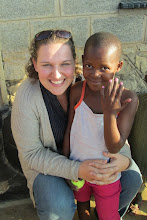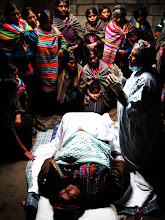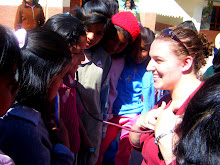The most significant decision I made while packing for Peace Corps wasn't in what I did pack, but in what I forgot to pack; I forgot to pack my wrist-watch. It was the same worn-out, silver-linked wrist-watch I'd worn through years of University, hours of studying during graduate school, and countless meticulously scheduled appointments while working at the American Cancer Society. The watch I lived my life in sync with; the clock that controlled my methodically planned life. Then I moved to Lesotho, and I accidentally left it behind. As it turned out, however, my packing oversight didn't make a bit of difference because in my little corner of Africa, time takes on a different meaning.
In Ha Selomo, life has a natural, almost “lazy” rhythm to it that makes watches nearly obsolete. Everything happens eventually, but worrying about "when" is pointless in a place where time itself seems optional. A pitso (village meeting called by the Chief) scheduled for 9am, will begin "on-time" at 11am. Khombis (public taxis) come when they want, and the shopong opens when bo-'Me' finish their morning chores. The pump has no water, until one evening it does. And there is no such thing as "time wasted…" Afternoons spent watching likhomo (cattle) graze are hours just as well spent as any other.
It’s a liberating experience to escape the ticking of a watch. And despite my ingrained cultural attitudes towards time, which have made my adjustment to Ha Selomo occasionally frustrating, I have adapted. Over the past 9 months, I’ve watched my rigid schedules and obsessive planning dissolve, and I’m a healthier person for it. Every morning, I rise just before sunrise and fall asleep naturally just after sunset. I do still own a small digital clock, but I rarely need it. My days are measured by the steady progress of the sun as it crosses the sky. From anywhere in the Linakeng Valley, I can point out the opposing ridges that I watch it rise and set over every day. Interestingly enough, this “awareness” has also meant that, for the first time in my life, I’ve noticed the shift of the sun’s arch with the passing of the months.
In the absence of a ticking clock, I find myself drawn to new kinds of rhythms- those of my body, my community, the seasons, the sun. I notice things like seasonal change more acutely. Every season seems to have it’s own rhythm, chores, and sounds that guide it’s passing. Paying attention and living through these seasons has helped me understand the mentality of my community of subsistence-farmers more deeply as well. My Ntate’s obsession with weather and lack of discussion about “the future” makes more sense when you consider that his entire livelihood lives and dies with THIS harvest. He doesn’t own a clock, that I know of, and probably never will. He doesn’t need to. Living in the present absolves the need for watches. He is tied to this moment, day and season in a way that I never witnessed, no less understood, before living here.
I see the same mentality with time play out in my students as well… They have trouble grasping the idea of truly envisioning and planning anything in the future. They want things “one day,” but they don’t obsess over achieving them the way that I did as a student. They don’t LIVE in the future. They live in the present as well, because their lives demand it. Their lives are full of present concerns and needs in a way that is foreign to many Americans- They need food now, are cold now, need money now. It’s a mentality of time that has both positive and negative affects on their school work and futures.
For me, adapting to a new concept of time has been the single healthiest lifestyle change that could have happened to me. The lack of attention to time is, without a doubt, one of my more frequent frustrations of living with Basotho. However, it’s also teaching me a valuable lesson about the importance of letting go and living in the moment. It’s a transforming experience… Realizing how much I don’t miss that little, ticking device that ruled my life. :)
With Love from Lesotho- Mary E.

 During PST, modeling our new seschweschwe that ‘Me’ made!
During PST, modeling our new seschweschwe that ‘Me’ made! 











































